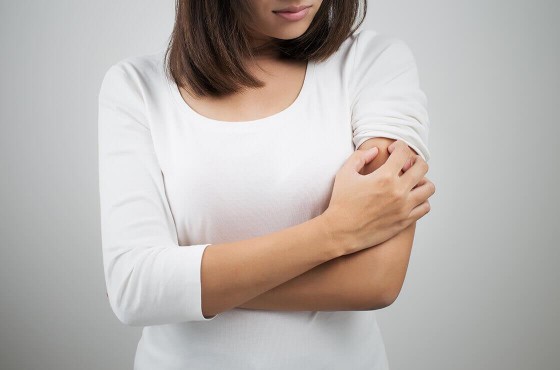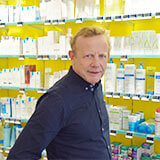Psoriasis:
natural treatments to improve your quality of life
Written by Paul Musset, Doctor in Pharmacy | published on | updated on 15/04/2024

Psoriasis is a chronic skin disease that, in most cases, remains benign. However, it is sometimes difficult to endure when it becomes visible. However, natural treatments can provide real help and relieve symptoms.
What is psoriasis?
Psoriasis is a chronic, non-contagious inflammatory disease that affects between 2% and 4% of the Western population. Its precise origins are unknown, but there is certainly a genetic component, since 40% of people with the disease have a family history. A person with an affected relative has a 5 to 10% risk of developing the disease. It most often occurs around the age of 20 or 30, but it can also occur in children.
Psoriasis affects the skin and causes the epidermal cells to renew themselves too rapidly (in 3 to 6 days instead of about a month) in certain areas, such as the scalp, palms, soles of the feet, skin folds, and in rare cases, mostly in children, on the face. The dead cells accumulate and, in most cases, form thick, whitish patches, which flake off in scales and leave behind reddish patches. The disease progresses in flare-ups that last a few weeks or months, followed by periods of remission that can last up to several years.
The different types of psoriasis
- Plaque psoriasis: This is the most common form, accounting for 80% of cases. The patches can reach more than ten centimetres in diameter.
- Guttate psoriasis: In this case, the patches are small, less than one centimetre in diameter, and spread over the torso, arms and thighs. This form mainly affects children and is usually triggered in the weeks following an ENT affliction. It develops for one month, then persists for a few weeks before disappearing. In some cases, it becomes chronic in the form of plaque psoriasis.
- Pustular psoriasis: This mainly concerns the hands and the sole of the feet. The patches are covered in small white pustules.
- Erythrodermic psoriasis: This form is serious and requires urgent hospital care. In this case, the entire body surface is affected and the patient often has a fever. The skin can no longer fulfil its role of protecting the body (barrier against infections, thermal regulation, etc.). There is a risk of dehydration or even, in the most serious cases, heart failure.
- Inverse psoriasis: No white patches, but red lesions that are often painful, as they are located in body folds and are therefore subject to friction.
- Psoriatic arthritis or psoriatic rheumatoid arthritis: In 7% of cases, relapses are accompanied by joint pain.
- Nail psoriasis: In combination or not with another form of psoriasis, nail psoriasis can deform the nails or make them appear orange in colour.
What are the factors that contribute to the development of psoriasis?
Certain factors increase the risk of developing the disease: excess body weight, diabetes, metabolic syndrome, and, of course, family history. The onset of flare-ups is not always easy to explain, but they can follow an injury or insect bite, excessive alcohol or tobacco consumption, sunburn or, on the contrary, exposure to the cold, or a period of stress. It is diagnosed following a clinical examination, possibly supplemented by a skin biopsy. Two scores are used to determine the severity of psoriasis in a patient. The PASI score (Psoriasis Area and Severity Index), and the DLQI (Dermatology Life Quality Index). In any event, if more than 10% of the skin’s surface is covered in plaques, it is considered a severe form.
Learn to recognise the triggers
Psoriasis flare-ups occur in a variety of situations from one person to another, depending on their sensitivity. Being in tune with yourself and learning to identify possible trigger actions or events (food, medication, fatigue, infection, stress, etc.) to avoid them as much as possible can greatly contribute to reducing the frequency of flare-ups.
How can psoriasis be treated?
We don’t know how to cure psoriasis. However, there are solutions that can alleviate the symptoms or reduce the frequency of flare-ups. Medical treatments include creams and ointments (or even shampoos) with corticosteroids that reduce the inflammation of the skin. But it is better to limit the duration of their use, as they can have side effects and their effectiveness may decrease over time. In more severe cases, an oral medication may be prescribed. UV phototherapy sessions can sometimes be used and, in the most severe cases, immunosuppressive injections.
Gentle natural treatments to reduce symptoms
There are really effective natural ways to help improve the lives of people with psoriasis. For example:
- Short exposures to sunlight (but don’t forget to protect yourself with sunscreen)
- Bathing for at least fifteen minutes in water with added treatment oils, moisturising and emollient creams (with mineral salts, urea, plants such as aloe vera, etc.)
- Enriching your diet with omega-3 (fatty fish or food supplements)
- Losing weight
- Quitting smoking
- Anything that can reduce stress: meditation, relaxation, sophrology, hypnotherapy, etc.
Psoriasis is not a shameful disease. It is, of course, difficult to have to contend with interrogative looks, but it is important to explain to others what is happening to you and to resist the temptation to lock yourself away. Psychological monitoring can help individuals maintain their self-confidence during flare-ups, as well as learn to better manage the stress and nervousness that lead to the appearance of the plaques.
Three key points to remember about psoriasis:
- In most cases, psoriasis is not a serious or contagious disease. It should not isolate you socially.
- Very important: This is an excellent reason to quit smoking, as the effect of smoking on the severity of symptoms has been proven by scientific studies.
- As a first step, it is preferable to focus on natural treatments to avoid the side effects of drugs and a decrease in their effectiveness over time.























